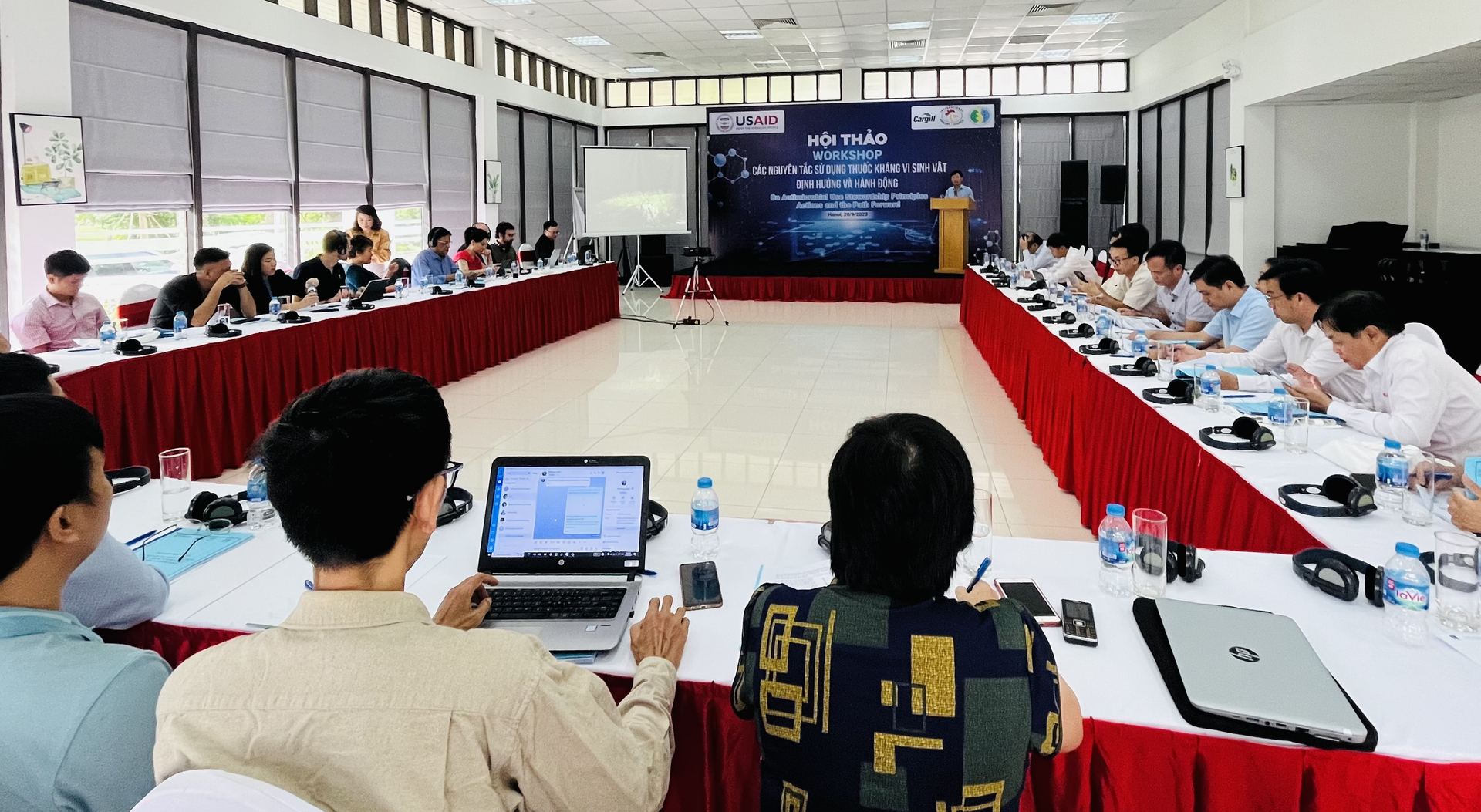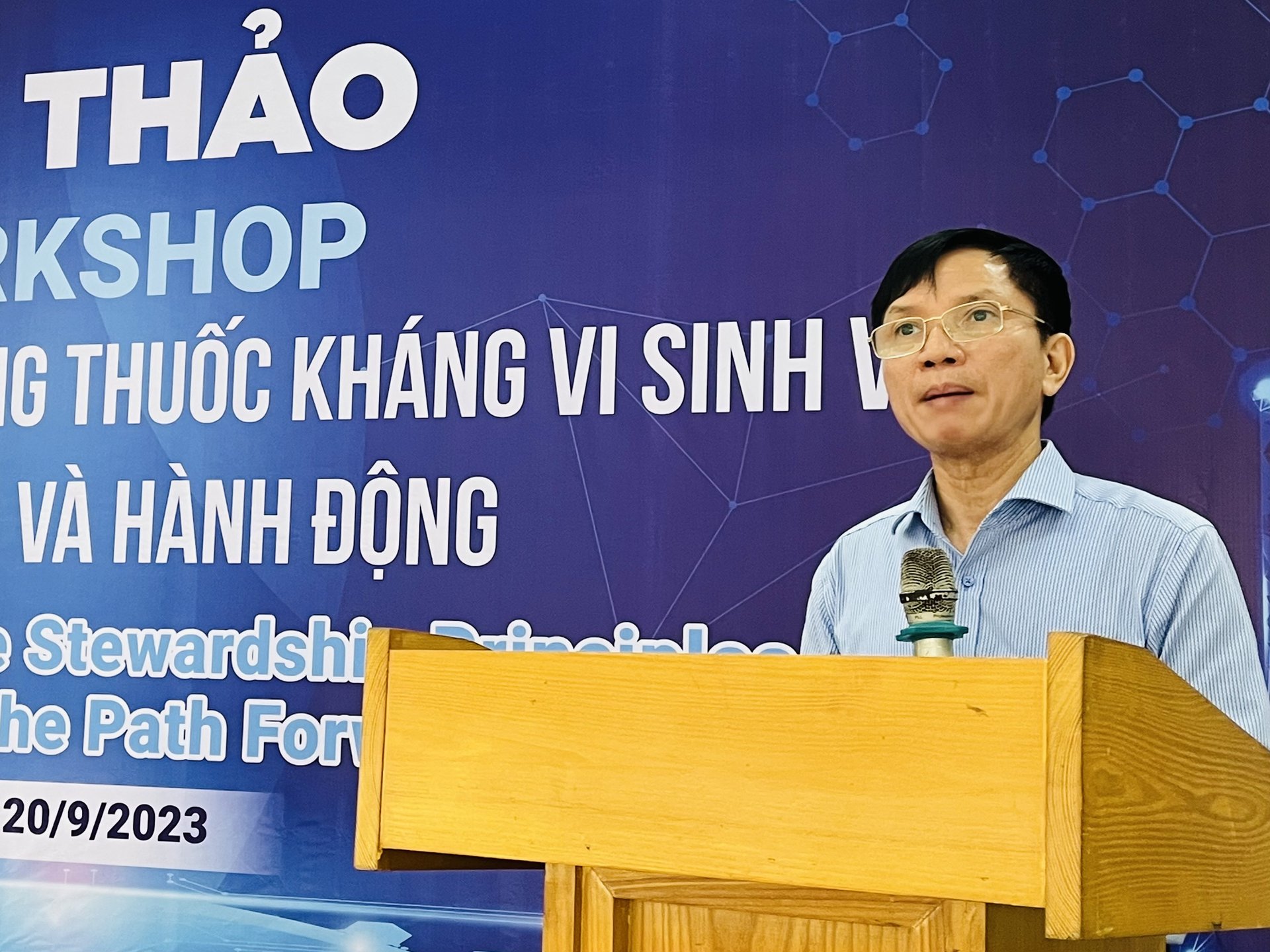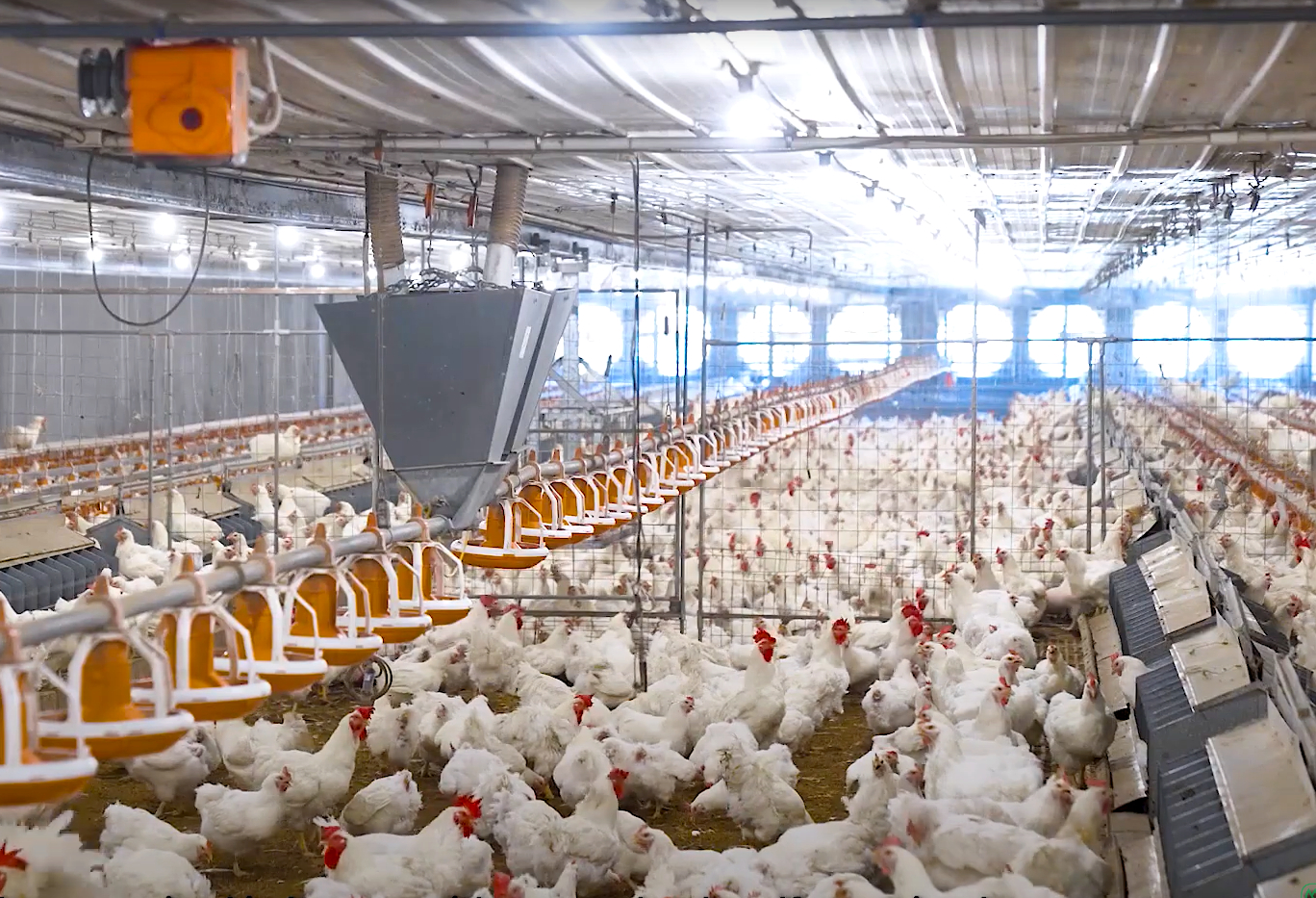80% of livestock farmers use antibiotics spontaneously
The workshop “Principles of using antimicrobials: Orientation and action” held on the morning of September 20 in Hanoi attracted a large number of attendees

The workshop “Principles of using antimicrobials: Orientation and action” held on the morning of September 20 in Hanoi attracted a large number of attendees.
Photo: Hong Tham.
1,000 Tons of Antibiotics for Pig Farming
Mr. Nguyen Thanh Son, Chairman of VIPA, stated that the misuse of antibiotics in livestock farming has led to antibiotic resistance, which is currently posing a significant threat to global health and development.
The World Health Organization (OIE) has warned that over 700,000 people worldwide die annually due to antibiotic-resistant bacteria. If the current rate of antibiotic resistance continues, by 2050, the number of deaths caused by antibiotic resistance could reach 10 million.
According to Mr. Son, in Vietnam, a 2015 investigation by the Department of Animal Health into the use of antibiotics in pig farming across five provinces—Dong Nai, Ba Ria-Vung Tau, Binh Duong, Thai Binh, and Nam Dinh—revealed that 100% of the farms used antibiotics for disease prevention and treatment in pigs.
Additionally, 68% of the farms used antibiotic-containing feed to prevent diseases and promote growth. Meanwhile, 24% of the farms mixed antibiotics into feed themselves for disease prevention and growth stimulation, with 1.23% of households using raw antibiotic materials for mixing.

Mr. Nguyen Thanh Son, Chairman of VIPA, said that the abuse of antibiotics in livestock farming has led to antibiotic resistance, which has, is, and will threaten global health and development. Photo: Hong Tham.
Mr. Son further stated that, according to the Department of Animal Health, while 100% of livestock farms use antibiotics, only 63% adhere to the correct dosage and treatment protocols. Southern provinces use antibiotics in livestock farming more frequently than northern provinces.
Mr. Bui Van Minh Bao, Technical Director of Tafa Viet Co., Ltd., noted that the discovery and application of antibiotics in livestock treatment represent a significant historical milestone for humanity.
The use of antibiotics in livestock farming has become increasingly widespread with various purposes: treating diseases in animals to ensure survival rates; controlling disease transmission within herds and preventing outbreaks; preemptively addressing common diseases to reduce treatment costs; improving livestock growth; and enhancing the efficiency of nutrient utilization.
“With the expansion of industrial-scale farming, increased livestock density, and significant environmental pressures, most livestock farmers now rely on antibiotics. Vietnam imports over 1,000 tons of antibiotics annually for pig farming and 50 tons for poultry farming. However, nearly 80% of farmers use antibiotics spontaneously without adhering to treatment protocols, resulting in antibiotic resistance and posing health risks to consumers,” Mr. Bao added.

Mr. Bui Van Minh Bao, Technical Director of Tafa Viet Co., Ltd., said that in order to develop Vietnam’s agriculture sector in general and livestock farming in particular effectively and sustainably, finding solutions to reduce antibiotics is very necessary. Photo: Hong Tham.
Solutions to Reduce Antibiotic Use
Mr. Dao Tuan Hung, the owner of a poultry farm in Thai Binh, expressed his concerns: “My farm currently raises 48,000 laying hens. While the principle is to minimize or move towards eliminating antibiotic use, it is very challenging in practice. Finding ways to reduce antibiotics, enhance productivity and quality, and deliver clean, high-quality products to consumers remains a major concern for producers like us.”
According to Mr. Bui Van Minh Bao, in Vietnam, veterinary costs typically account for 5–7% of production costs and can rise to 10–12% during disease outbreaks. In developed countries like the Netherlands, where advanced technology and biosecurity are applied effectively, this cost can be reduced to as low as 0.5%.
Mr. Bao stated that Tafa Viet is implementing an 8-step production process aimed at boosting natural immunity. This includes biosecurity measures, high-quality breeding stock, balanced nutrition, clean water, optimized barn microclimates, vaccination monitoring programs, post-vaccination surveillance, digitized data systems, and workforce training.
“To develop Vietnam’s agriculture and livestock sectors sustainably and efficiently, finding solutions to reduce antibiotic use is essential. Breeding companies should focus on improving stock quality; feed producers need to create balanced nutritional formulas that are economically viable while being environmentally friendly; and pharmaceutical companies should prioritize importing vaccines, bacterial agents, and biological products to replace antibiotics,” Mr. Bao proposed.
Similarly, Mr. Pham Huu Quang from CP Vietnam Livestock Joint Stock Company emphasized that identifying the root causes of antibiotic use is the first step in reducing it. CP Vietnam has identified two main reasons: disease outbreaks and poor management or care, which weakens livestock immunity and necessitates antibiotic treatment.
Mr. Quang also shared CP Vietnam’s experiences in reducing antibiotic use through measures such as: Producing high-quality breeding stocks, Raising poultry in enclosed farms with automated systems to regulate temperature, ventilation, and air quality tailored to each growth stage, creating the best environment for animals to eat and grow; Utilizing automatic feeding and drinking systems to ensure clean, adequate food and water; Minimizing human intervention inside barns during the rearing process; Implementing a vaccination program for proactive immunity; Using probiotics as an alternative to antibiotics.

Reducing and moving towards zero antibiotic use in livestock farming is a big challenge. Photo: Hong Tham.
Ms. Le Thi Hue, Deputy Head of the Drug Management Division, Department of Animal Health (MARD), stated that the National Action Plan on Antimicrobial Resistance Prevention has been issued by the Ministry of Agriculture and Rural Development (MARD). This plan consists of two phases: the first phase (2017–2020) focused on livestock farming and aquaculture; the second phase (2021–2025) expands to include the entire agricultural sector.
MARD has also promulgated Circular No. 12/2020/TT-BNNPTNT, which regulates the management of veterinary drugs containing narcotics and precursors, veterinary prescriptions, and amendments to Circular No. 18/2018/TT-BNNPTNT. These measures aim to ensure antibiotics are not misused, are used for the right purposes and in the correct dosages, to avoid antibiotic resistance in livestock farming and aquaculture.
“We hope that veterinary drug manufacturers and poultry farming establishments will implement the state regulations in practice, moving toward producing clean poultry products that ensure consumer health,” Ms. Hue added.
Mr. Nguyen Thanh Son, President of VIPA, emphasized: “Minimizing and ultimately eliminating antibiotics in livestock farming is a significant challenge. Despite the difficulty, we must persevere because this issue affects ourselves, our families, and the opportunity to consume high-quality and safe livestock products,” Mr. Son affirmed.
Mr. Dennis Erpeiding, from the International Poultry Council (IPC), remarked: “Poultry meat has now become the most popular type of meat globally. Vietnam’s poultry sector is poised for substantial growth and will play an important role in the future. Gradually reducing and moving toward eliminating antibiotics in poultry farming is essential.
To achieve this, biosecurity, hygiene, poultry care methods, and nutrition must be prioritized. It is crucial to identify the diseases that poultry may encounter at each growth stage and implement preventative measures to keep poultry healthy. This is the most effective way to reduce and eventually eliminate antibiotic use.”
The workshop titled “Principles of Antimicrobial Use: Directions and Actions” was held in Thach That District, Hanoi, on September 20, organized by the Vietnam Poultry Association (VIPA) in collaboration with Cargill and the International Poultry Council (IPC). The workshop is part of the Transformational Risk Reduction in Farm Production (TRASFORM) project implemented by Cargill and IPC.
By Hong Tham
Source: Vietnam Agriculture Newspaper
